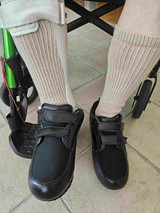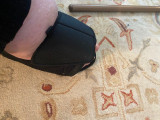iWatch - Data Protection Vs Health Benefits
iWatch - The Balance of Data Protection Vs Health Benefits
The timing of the media reports of the alleged raids on the iCloud accounts of celebrities Jennifer Lawrence and Mary Winstead and the leaking of intimate photographs or more than 100 celebrities, could not have been worse for Apple.
Apple’s new iPhone 6 launches next week along with plans for a new a new generation of health and fitness apps which will track data including exercise levels and sleep. The fitness band, dubbed “iWatch” by industry insiders syncs with the phone and is one of the key features of a new mobile operating system, and now, as a result of the leaks, the key talking point has now become Apple’s privacy policy.
Apple is not the first company to develop the concept of wearing your life on your sleeve. Jawbone, the wearable healthcare group announced that it filed patent applications in Europe and the US that relate to “lifeotypes” – profiles of individuals that combine real time fitness data with other information such as health records, an individual’s mood or online purchase history.
Unsurprisingly, the concerns over how secure the data is and whether developers will use personal data and the need to ensure compliance with patient HIPAA privacy rules if the real potential of the platform is to be realized. Apple is introducing rules that will stop data from being collected through Apple’s new HealthKit launched in June. HealthKit allows users to track heart rate, calorie intake, movement and other fitness metrics from different aps in one place. The Apple imposed rules prevent data from being used to target ads for products such as weight-loss remedies. Apple has a big stick as it threatens to eject developers and their deviant apps from the App Store should the privacy policy be breached.
In May, the US Federal Trade Commission called for tighter rules after a 17 month investigation that discovered that the data broker industry had created categories that focus on health conditions such as high cholesterol, diabetes and even pregnancy. It seems that Jawbone’s patents that connect wearables to the patient’s wallet took a hit to the chin. The Financial Times reported last year that many of the top fitness aps were selling information to about 70 third party companies. Mapping your run might seem a fairly uninteresting nugget of information to anyone but the runner, but to data dealers it’s a goldmine when combined with data from other apps that track a range of habits from food preferences to when a menstrual cycle starts.
But for all the concern, the upside has to be huge. Apps that can help a patient monitor their sugar intake, diet, alcohol use, training regimens, fitness levels, weight, body fat, hydration and everything in between have got to be a huge step in the right direction. The benefits to the nation’s health and the reduction in health care costs are perhaps immeasurable, but in my opinion wearables are a good thing and they are here to stay. Privacy concerns will no doubt be a favorite of the talking heads, but Siri telling you “Don’t even think about it” as you get within range of your local Dunkin Donuts or telling you where your nearest salad bar is as your metabolism needs nourishment, though arguably encroaching on privacy issues, isn’t necessarily a bad thing is it?
If a wearable device that interfaces with my mobile device could feed the key metrics to my healthcare provider in a prophylactic managed care protocol that would result in my monthly healthcare premiums be reduced - I’d be all in.
The irony? It seems as though the Jawbone really is connected to the hip bone.
Stephen O'Hare also writes a blog on www.pedors247.com - the Pedors Business to Business portal.
Explore Popular Articles
I would encourage you to buy Pedors, you will not be sorry that you did.
Why I Wear Pedors - by Bill B Do you mind sharing in general terms your primary foot issue or issues...
I love my Pedors Sandals
I love my Pedors Sandals, by Sandy W Because of lymphedema in both legs and feet, I have not been...
Tell Your Pedors Story #5 - Carlo and Pedors
Do you mind sharing in general terms your primary foot issue or issues? Since early 2023, I have suf...
Tell Your Pedors Story #4 - Debbie S
Hi, my husband has swollen feet and legs. He was not able to put his feet into shoes. I spent hours...
Tell Your Pedors Story #3 - Donna J
Tell Your Pedors Story #3 - Donna J - Shoes For Lymphedema and Lipodema After reading Donna's amazin...
Tell Your Pedors Story #2 - Mildred and Penny D
Wedding Shoes For Swollen Feet Penny conversed with me over email after I reached out to her mothe...



